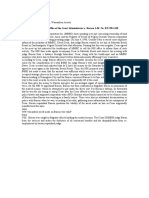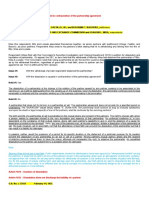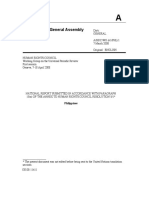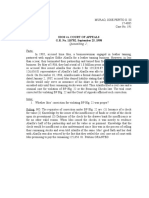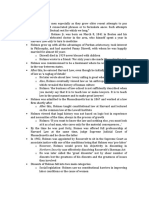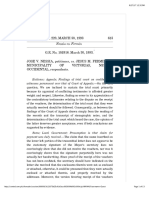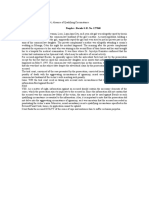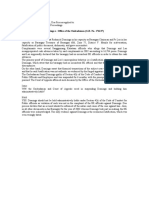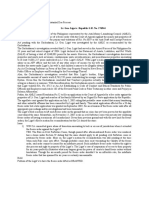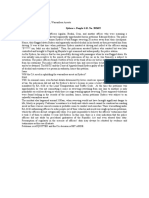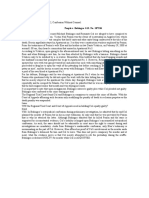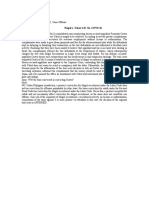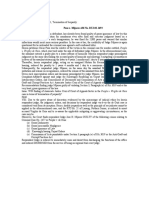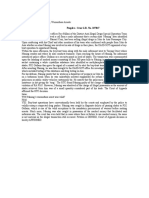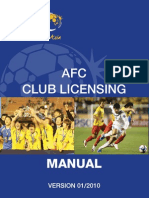Ortega v. CA
Ortega v. CA
Uploaded by
JP Murao IIICopyright:
Available Formats
Ortega v. CA
Ortega v. CA
Uploaded by
JP Murao IIICopyright
Available Formats
Share this document
Did you find this document useful?
Is this content inappropriate?
Copyright:
Available Formats
Ortega v. CA
Ortega v. CA
Uploaded by
JP Murao IIICopyright:
Available Formats
Ortega et al. v.
CA, SEC, and Misa (1995)
Facts: The law firm Ross, Lawrence, Selph, and Carrasco was duly registered in the Mercantile
Registry in 1937 and was reconstituted in the SEC. From its constitution, the firm has changed its
firm name 6 times with private respondent Joaquin L. Misa and two others associating themselves as
senior partners and petitioners Gregorio Ortega and two others as junior partner. In February 17,
1988, Misa wrote 2 letters to petitioners informing them of his withdrawal as partner effective at the
end of the month and the liquidation of his interest in two floors of their building. Misa wrote a third
letter, in which he gave the thwarted increase in the pay scale of their employees and public
humiliation even of attorneys, by his fellow partners, as the reasons for his withdrawal as partner.
Soon after, Misa filed with the SEC’s Security Investigation and Clearing Department (SICD) a petition
for dissolution and liquidation of partnership praying for delivery of his share of partnership assets
and the disallowing of the use of the firm name, ‘Bito, Misa, and Lozada’.
The problem started when the Security, Investigation, and Clearing Department of the SEC ruled that
Misa’s withdrawal does not dissolve the law partnership and that Misa and the senior partners
should abide by their Agreement.
On appeal, the SEC en banc reversed the SICD’s decision and held that Misa’s withdrawal effectively
dissolved the partnership, regardless of good faith or bad faith, as a partnership at will. The case was
then remanded to the Hearing Officer for determination of rights and obligations. With the junior
partners motion for reconsideration and Misa’s petition for the appointment of a receiver being
denied.
As the case was pending in the CA, the other senior partners, Bito and Lozada passed away and this
prompted a renewed petition for the appointment of a receiver to preserve partnership assets. The
CA affirmed in toto the SEC decision that Misa’s withdrawal dissolved the partnership, his
withdrawal was not in bad faith, that Misa’s interest should be computed and paid, and that case be
remanded to the SEC Hearing Officer. The CA also seconded the SEC’s decision that the appointment
of a receiver was unnecessary as the partnership assets were not in danger of being lost, removed, or
materially impaired.
Issue: W/N the CA erred in ruling that Respondent Misa’s withdrawal from the law firm dissolved the
partnership at will?
Held: NO. The Amended Articles of Partnership submitted for registration with the SEC in 1948 did
not provide for a specific duration and even stipulated that the partnership would continue so long as
it was ‘mutually satisfactory’. The determination of the Hearing Officer that the partnership was one
for a specific undertaking as the Amended Articles of Partnership was to act as legal adviser for
persons and entities was improper as such purpose was not specific. Even if a specific purpose or
duration was stipulated, a partner can dissolve a partnership at his will as an offshoot of delectus
personae (partners having the choice of persons to partner with). The partner dissolving just needs
to act in good faith so as not to be liable for damages. Also, since the liquidation of the interest of a
retiring/ dissociating partner to the firm was specifically stipulated to dependent upon the
determination of appraisers, it shall be liquidated as such. Lastly, Misa’s ‘interpersonal conflict’ was
justified as no partner shall remain one against their will, and as such, Misa is deemed to be in good
faith. CA decision AFFIRMED.
You might also like
- No. Law Firm Associate Salary CommentDocument4 pagesNo. Law Firm Associate Salary CommentEzekiel Chin100% (1)
- Digest - Ortega vs. CADocument1 pageDigest - Ortega vs. CAPaul Vincent CunananNo ratings yet
- Acc1001 AssignmentDocument8 pagesAcc1001 AssignmentAndrew TanNo ratings yet
- Office of The Court Administrator v. Barron A.M. No. RTJ 98-1420Document1 pageOffice of The Court Administrator v. Barron A.M. No. RTJ 98-1420JP Murao IIINo ratings yet
- Lacson v. Executive Secretary G.R. No.128096Document1 pageLacson v. Executive Secretary G.R. No.128096JP Murao IIINo ratings yet
- 19 - People v. Besonia - Murao PDFDocument1 page19 - People v. Besonia - Murao PDFJP Murao IIINo ratings yet
- Ortega - Case DigestDocument2 pagesOrtega - Case DigestJhona May Golilao QuiamcoNo ratings yet
- Principle of Delectus PersonaeDocument16 pagesPrinciple of Delectus PersonaeZMPonay50% (2)
- Ortega v. CA - DigestDocument3 pagesOrtega v. CA - DigestJaysieMicabalo100% (1)
- Ortega vs. CA, G.R. No. 109248 July 3, 1995Document1 pageOrtega vs. CA, G.R. No. 109248 July 3, 1995Susie SotoNo ratings yet
- (Agency) 91 - Ortega V CADocument2 pages(Agency) 91 - Ortega V CAALEC NICOLE PARAFINANo ratings yet
- Ortega Vs CADocument3 pagesOrtega Vs CAj531823No ratings yet
- Ortega V CADocument7 pagesOrtega V CAHudson CeeNo ratings yet
- Ortega vs. Court of Appeals, G.R. No. 109248 - Case Digest (Birth - Life of Partnership Based On Will of Parties)Document2 pagesOrtega vs. Court of Appeals, G.R. No. 109248 - Case Digest (Birth - Life of Partnership Based On Will of Parties)Alena Icao-AnotadoNo ratings yet
- Ortega, Et Al. vs. CA, Et Al., 245 SCRA 529: VITUG, J.: G.R. No. 109248. July 3, 1995Document3 pagesOrtega, Et Al. vs. CA, Et Al., 245 SCRA 529: VITUG, J.: G.R. No. 109248. July 3, 1995Marites regaliaNo ratings yet
- Page2 CasesDocument45 pagesPage2 CasesSylver JanNo ratings yet
- Ortega v. Ca 245 Scra 529 (1995)Document4 pagesOrtega v. Ca 245 Scra 529 (1995)FranzMordenoNo ratings yet
- Ortega vs. CADocument2 pagesOrtega vs. CAKristine Hipolito SerranoNo ratings yet
- 13 Ortega Vs CA, GR No. 109248, July 3, 1995 PDFDocument9 pages13 Ortega Vs CA, GR No. 109248, July 3, 1995 PDFMark Emmanuel LazatinNo ratings yet
- CASE DIGEST NewDocument2 pagesCASE DIGEST NewOLAF AUGUSTUS BENOSANo ratings yet
- Ortega vs. CaDocument3 pagesOrtega vs. CaEunice Kalaw VargasNo ratings yet
- C. PartnershipDocument66 pagesC. PartnershipFaye CruzNo ratings yet
- Partnership Cases 3 DigestDocument8 pagesPartnership Cases 3 DigestbalunosarronNo ratings yet
- Partnership CasesDocument30 pagesPartnership CasesMarie Mariñas-delos ReyesNo ratings yet
- Ortega Et Al Vs CADocument5 pagesOrtega Et Al Vs CAZahraMinaNo ratings yet
- PatDocument93 pagesPatKrisNo ratings yet
- Documents - MX - Digestortega Vs CaDocument2 pagesDocuments - MX - Digestortega Vs CaaliahNo ratings yet
- Ortega v. CADocument3 pagesOrtega v. CAMaria Lourdes DatorNo ratings yet
- Partnership: Abantas. Abinal. Jaranilla. Ignalig. TiosenDocument3 pagesPartnership: Abantas. Abinal. Jaranilla. Ignalig. TiosenSHARIEF ABBAS ABANTASNo ratings yet
- 32 34 PartnershipDocument5 pages32 34 PartnershipdextlabNo ratings yet
- Republic of The Philippines Manila Third Division: Supreme CourtDocument44 pagesRepublic of The Philippines Manila Third Division: Supreme CourtJeffreyReyesNo ratings yet
- Partnership CasesDocument70 pagesPartnership CasesIna VillaricaNo ratings yet
- Gregorio Ortega Vs CADocument4 pagesGregorio Ortega Vs CAJesabel ParacadNo ratings yet
- Agency Cases UpdatedDocument31 pagesAgency Cases UpdatedCarlo John C. RuelanNo ratings yet
- Partnership 102 106Document26 pagesPartnership 102 106Edmund Pulvera Valenzuela IINo ratings yet
- Ortega Vs CA Full TextDocument6 pagesOrtega Vs CA Full TextOwen BuenaventuraNo ratings yet
- Partnership CasesDocument228 pagesPartnership CasesshenzhenNo ratings yet
- 1785 - Ortega vs. Court of Appeals, 245 SCRA 529 - DIGESTDocument2 pages1785 - Ortega vs. Court of Appeals, 245 SCRA 529 - DIGESTI took her to my penthouse and i freaked itNo ratings yet
- Ortega v. Court of AppealsDocument2 pagesOrtega v. Court of AppealsFranzMordenoNo ratings yet
- Atp Cases4Document21 pagesAtp Cases4KeppyyNo ratings yet
- G.R. No. 109248Document2 pagesG.R. No. 109248Jillian BatacNo ratings yet
- Ortega Vs CADocument4 pagesOrtega Vs CAPACNo ratings yet
- Digested Cases On Agency, Trust and Partnership: Submitted By: Ranel de LaraDocument45 pagesDigested Cases On Agency, Trust and Partnership: Submitted By: Ranel de LaraLee100% (1)
- PartDocument456 pagesPartsujeeNo ratings yet
- Yu v. NLRC GR No. 97212, June 30, 1993 FactsDocument37 pagesYu v. NLRC GR No. 97212, June 30, 1993 FactsNylaNo ratings yet
- GREGORIO F. ORTEGA Et Al. vs. CA Et Al G.R. No. 109248 Jul 3, 1995 - DigestDocument2 pagesGREGORIO F. ORTEGA Et Al. vs. CA Et Al G.R. No. 109248 Jul 3, 1995 - DigestMichelle Lim0% (1)
- Ortega vs. Court of Appeals, 245 SCRA 529 5. Estanislao, Jr. vs. Court of Appeals, 160 SCRA 830Document8 pagesOrtega vs. Court of Appeals, 245 SCRA 529 5. Estanislao, Jr. vs. Court of Appeals, 160 SCRA 830Veepee PanzoNo ratings yet
- Villareal V. Ramirez: Lendferndz Biadno 3:06 AM No CommentsDocument5 pagesVillareal V. Ramirez: Lendferndz Biadno 3:06 AM No CommentsJoseph PamaongNo ratings yet
- Partnership CaseDocument15 pagesPartnership Casenheldelara100% (1)
- Partnership Agency Case DigestsDocument45 pagesPartnership Agency Case DigestsKia Bi100% (3)
- 36 Gregorio F Ortega Et Al Vs Court of Appeals Et AlDocument5 pages36 Gregorio F Ortega Et Al Vs Court of Appeals Et Alcertiorari19No ratings yet
- Vesagas vs. CA, G.R. No. 142924. December 5, 2001 - DissolutionDocument10 pagesVesagas vs. CA, G.R. No. 142924. December 5, 2001 - Dissolution8tvtynvjyzNo ratings yet
- 1 - Vesagas vs. CA, G.R. No. 142924. December 5, 2001Document9 pages1 - Vesagas vs. CA, G.R. No. 142924. December 5, 2001Florence RoseteNo ratings yet
- Fernando Santos Vs Spouses Arsenio and Nieves Reyes: FactsDocument16 pagesFernando Santos Vs Spouses Arsenio and Nieves Reyes: FactsHanna AyonNo ratings yet
- 2 Ortega vs. Court of Appeals, G.R. No. 109248, July 3, 1995Document6 pages2 Ortega vs. Court of Appeals, G.R. No. 109248, July 3, 1995NarcyNo ratings yet
- Ortega Vs CA, 245 SCRA 529Document7 pagesOrtega Vs CA, 245 SCRA 529Robinson MojicaNo ratings yet
- Gokongwei v. SecDocument26 pagesGokongwei v. SecReghz De Guzman Pamatian100% (4)
- G.R. No. 109248Document9 pagesG.R. No. 109248Henson MontalvoNo ratings yet
- BUSORGII Set 1 Case DigestsDocument19 pagesBUSORGII Set 1 Case DigestsJaphet C. Villaruel100% (1)
- Ortega vs. Court of Appeals, 245 SCRA 529Document6 pagesOrtega vs. Court of Appeals, 245 SCRA 529Santiago Tiongco100% (1)
- Case DigestsDocument11 pagesCase DigestsAlexandra Victoria MendozaNo ratings yet
- PAT Cases Article 1785 1809Document81 pagesPAT Cases Article 1785 1809Internal AuditNo ratings yet
- Partnership Agency Case DigestsDocument41 pagesPartnership Agency Case DigestsdarcyNo ratings yet
- General Assembly: United NationsDocument26 pagesGeneral Assembly: United NationsJP Murao IIINo ratings yet
- Idos vs. Court of Appeals G.R. No. 110782. September 25, 1998Document1 pageIdos vs. Court of Appeals G.R. No. 110782. September 25, 1998JP Murao IIINo ratings yet
- Victorio v. Court of AppealsDocument1 pageVictorio v. Court of AppealsJP Murao IIINo ratings yet
- Northern Security Case Effectively Dissolving Roosevelt's Sherman ActDocument2 pagesNorthern Security Case Effectively Dissolving Roosevelt's Sherman ActJP Murao IIINo ratings yet
- Nessia vs. FerminDocument13 pagesNessia vs. FerminJP Murao IIINo ratings yet
- People v. Bacule G.R. No. 127568Document1 pagePeople v. Bacule G.R. No. 127568JP Murao IIINo ratings yet
- Domingo v. Office of The Ombudsman (G.R. No. 176127)Document1 pageDomingo v. Office of The Ombudsman (G.R. No. 176127)JP Murao III100% (2)
- Lt. Gen. Ligot v. Republic G.R. No. 176944Document1 pageLt. Gen. Ligot v. Republic G.R. No. 176944JP Murao IIINo ratings yet
- Sydeco v. People G.R. No. 202692Document1 pageSydeco v. People G.R. No. 202692JP Murao IIINo ratings yet
- People v. Bokingco G.R. No. 187536Document1 pagePeople v. Bokingco G.R. No. 187536JP Murao III100% (1)
- People v. YabutDocument1 pagePeople v. YabutJP Murao IIINo ratings yet
- People v. ArceoDocument1 pagePeople v. ArceoJP Murao IIINo ratings yet
- People v. LoveriaDocument1 pagePeople v. LoveriaJP Murao IIINo ratings yet
- Land Bank of The Philippines v. Gallego (G.R. No. 173226)Document1 pageLand Bank of The Philippines v. Gallego (G.R. No. 173226)JP Murao III100% (1)
- People v. Baltazar G.R. No. 130610Document1 pagePeople v. Baltazar G.R. No. 130610JP Murao IIINo ratings yet
- V. Virgilio de Guia, Which Was Tried Under The Sala of Defendant Judge Mijares. in The Aforementioned CaseDocument1 pageV. Virgilio de Guia, Which Was Tried Under The Sala of Defendant Judge Mijares. in The Aforementioned CaseJP Murao IIINo ratings yet
- People v. PedresDocument1 pagePeople v. PedresJP Murao IIINo ratings yet
- People v. Cruz G.R. No. 187047Document1 pagePeople v. Cruz G.R. No. 187047JP Murao IIINo ratings yet
- People v. Alicando G.R. No. 117487Document1 pagePeople v. Alicando G.R. No. 117487JP Murao IIINo ratings yet
- PBM Employees v. PBMDocument1 pagePBM Employees v. PBMJP Murao IIINo ratings yet
- People v. ManansalaDocument1 pagePeople v. ManansalaJP Murao IIINo ratings yet
- People v. Aquino G.R. No. 130742Document1 pagePeople v. Aquino G.R. No. 130742JP Murao IIINo ratings yet
- People v. de La Cruz G.R. No. 173308Document1 pagePeople v. de La Cruz G.R. No. 173308JP Murao IIINo ratings yet
- Student Affairs Committee Lenape Plaque StatementDocument1 pageStudent Affairs Committee Lenape Plaque StatementColumbia Daily SpectatorNo ratings yet
- U.S. v. DorriDocument8 pagesU.S. v. DorrijoshNo ratings yet
- Comparison of PCATP and PEC Code of ConductDocument2 pagesComparison of PCATP and PEC Code of ConductMuhammad ArbazNo ratings yet
- Cites:1870342: Supreme Court of IndiaDocument5 pagesCites:1870342: Supreme Court of IndiaDivakar Pullam ChettiNo ratings yet
- Cyber Security PolicyDocument5 pagesCyber Security PolicymetaouiNo ratings yet
- Nexa PriceDocument1 pageNexa Priceunbelievable.phoenixNo ratings yet
- Paul Urban MissionDocument26 pagesPaul Urban MissionFrank GilesNo ratings yet
- Od 225991033389305000Document1 pageOd 225991033389305000Iqbal khanNo ratings yet
- IAS Plus IAS 29, Financial..Document3 pagesIAS Plus IAS 29, Financial..Buddha BlessedNo ratings yet
- Annual Report - 2020 - Indomobil SuksesDocument436 pagesAnnual Report - 2020 - Indomobil SuksesaldoNo ratings yet
- Academic Calender Odd Semester 2023-24Document1 pageAcademic Calender Odd Semester 2023-24raghurajj432No ratings yet
- Facts: Liban Vs Gordon GR No. 175352 January 18, 2011Document3 pagesFacts: Liban Vs Gordon GR No. 175352 January 18, 2011Phie CuetoNo ratings yet
- Mongoose User Manual ProDocument16 pagesMongoose User Manual Protinhkt2003100% (1)
- 35 videoDocument6 pages35 videokimthesecond2No ratings yet
- Public Notice 16.01.2024Document2 pagesPublic Notice 16.01.2024Madhan Rao RaoNo ratings yet
- Ratio AnalysisDocument5 pagesRatio AnalysisganeshNo ratings yet
- IRS Form 706Document43 pagesIRS Form 706Ambassador tiggle el100% (3)
- AFC Club Licensing Manual 1-2010Document180 pagesAFC Club Licensing Manual 1-2010Mohd Syarizal Md Isa100% (1)
- Gears AppendixDocument7 pagesGears AppendixPratik ThapaNo ratings yet
- Higher Certificate and Degree Student Calendar 2023Document1 pageHigher Certificate and Degree Student Calendar 2023Nkosinathi MasukuNo ratings yet
- Msds Na2S2O3.5H2ODocument6 pagesMsds Na2S2O3.5H2OLuthfi Prananta WibawaNo ratings yet
- Project On Indenting AgentsDocument94 pagesProject On Indenting AgentsSateesh Prem GuptaNo ratings yet
- Transformation Services: Council Tax Exemption FormDocument2 pagesTransformation Services: Council Tax Exemption FormSanjeev KambojNo ratings yet
- 175 030100Document2 pages175 030100Abu Anas M.Salaheldin100% (1)
- Arbitral Proceedings Cannot Be Imposed On A Debenture Trustee Under A Scheme of Compromise, in The Absence of An Arbitration Agreement - Bombay High CourtDocument18 pagesArbitral Proceedings Cannot Be Imposed On A Debenture Trustee Under A Scheme of Compromise, in The Absence of An Arbitration Agreement - Bombay High CourtShivani ChoudharyNo ratings yet
- ACLU Letter Re: COVID-19Document3 pagesACLU Letter Re: COVID-19Honolulu Star-AdvertiserNo ratings yet
- Archmodel Vol. 149Document7 pagesArchmodel Vol. 149Rafael De Souza SilvaNo ratings yet
- United States v. Richard Vitrano, A/K/A Richard Ruben, 746 F.2d 766, 11th Cir. (1984)Document6 pagesUnited States v. Richard Vitrano, A/K/A Richard Ruben, 746 F.2d 766, 11th Cir. (1984)Scribd Government DocsNo ratings yet



